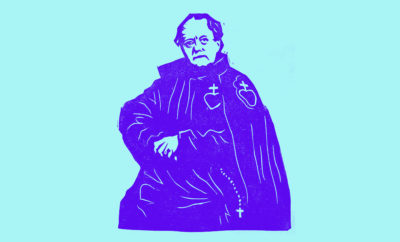Saint Paul of the Cross, born Paul Francis Danei in 1694, founded the Congregation of the Passion in 1720, in northern Italy.
Paul was the second of sixteen children in his family. Luke Danei, the saint’s father, ran a small tobacco shop. As his family increased, being plagued with poverty and even involved in civil litigation, he moved his family quite often during Paul’s childhood. In 1701, the family moved to Cremolino, a suburb of Monferrato, not too far from Ovada – where Paul began his schooling under the Carmelite Fathers there.
In his mid-twenties, Paul had a profound mystical experience, which prompted him to embark on a forty day retreat in a single room attached to a church. Paul wrote down his experiences, and is regarded as one of the foremost mystics of his century. After the retreat, he felt God was calling him to start an Order; so he gathered companions to share his life.
He had visions where he saw himself wearing a black robe (the clothing of the poor at the time) and of what is now the Passionist sign (see below). The original name for the Order was ‘The Poor of Jesus’. They lived in a very real voluntary poverty. Apart from Paul’s blood brother Jean Baptist, all the early brothers left as it was too rigorous and many became ill. Paul’s intense spiritual experience led him to emphasise strongly the contemplative part of the life of his Order, which, following St Ignatius’ Jesuits, were to be a form of ‘active contemplative’, expressed as a type of semi-monastic life.

At a later point, following a spiritual revelation, Paul was inspired to make the Passion the centre of the charism and spirituality of his new community, hence the official name ‘The Congregation of the Passion of Jesus Christ’. Paul felt that the Passion was being forgotten.
In fact, there was plenty of devotional literature and practices relating to the Passion in 18th Century Italy, but Paul believed the Passion was not being understood correctly. He saw the Passion as ‘the greatest, most overwhelming, work of God’s love’. For Paul, the Passion was a revelation of the love of God: it was not about placating an angry God, or about guilt, or even in a sense about suffering, except in as much as the suffering of one who is loved will lead to the one who loves to compassion for the sufferer, that is, suffering-with. This overwhelming sense of the love of God is very much in common with all profound and genuine mystical experiences.
The Passion of Jesus is central to Passionist life, such that each Passionist takes an extra vow, (a fourth, or first vow) to ‘keep alive the memory of the Passion’. This Memoria Passionis is at the heart of Passionist life, charism and spirituality. Everything is ordered towards making that mission possible.
By reminding people of the Passion, Paul of the Cross had the intention of reminding people of the overwhelming love of God. This was manifested by a real compassion and love that people felt was present in Paul. It was also manifested very obviously in his preaching of the passion, and teaching meditation on the Passion. At that time, it was generally felt that meditation was for priests and religious, so to teach lay people in this way was innovative. Part of the continuing Passionist commitment to poverty was also a commitment to the poor.
For Paul, the Passion was a revelation of the love of God: it was not about placating an angry God, or even in a sense about suffering, except in compassion for the sufferer (that is, suffering-with).
The early Passionist communities were in the part of Italy just north of Rome. The first Passionist community was on the island of Monte Argentario, because of its poverty, silence and solitude. Later, Paul realised he needed to be in a less isolated place in order to be able to carry out the mission God had given him. So they moved to a place called ‘the marema’, a marshy land, full of mosquitoes and disease, a place which was avoided by the majority of clergy and religious because of the conditions and the poverty of the people. In that sense it was a place without much presence of the Church, without much religious practice or knowledge. It was to such uneducated and impoverished people that Paul went, to teach them of God’s love through the Passion. He would also help in any way necessary in the pastoral work in the locality, for example teaching catechism. In this way, Paul and the early Passionists carried out a form of mission in their own country.
Paul developed a typically Passionist style of preaching, and a practice of travelling within the area and wider to give ‘missions’. He had to struggle to get his Rule accepted by the Church, with considerable modifications. After 20 years of trying to start an Order, only Paul and his brother had persisted; but by the time of his death in 1775, his congregation was flourishing.
The Passionists did not grow beyond Italy (apart from a brief attempt to start a presence in Bulgaria) until the 19th Century. However, in his early mystical experiences, Paul had been inspired to pray for England and shortly before his death, he had a vision of his ‘children’ in England. So in 1841 Dominic Barberi arrived with a few companions, via a foundation in what is now Belgium.
Further Watching
Related Stories

Who was Father Ignatius Spencer, and why is he important to the Passionist movement in England?
Aug 04 2020

Who was Dominic Barberi, and how did he come to found the Passionists movement in England?
Jul 17 2020

The Passionists are a Catholic Religious Order, as well as a worldwide family who dedicate themselves to Passionist principles.
May 21 2021

